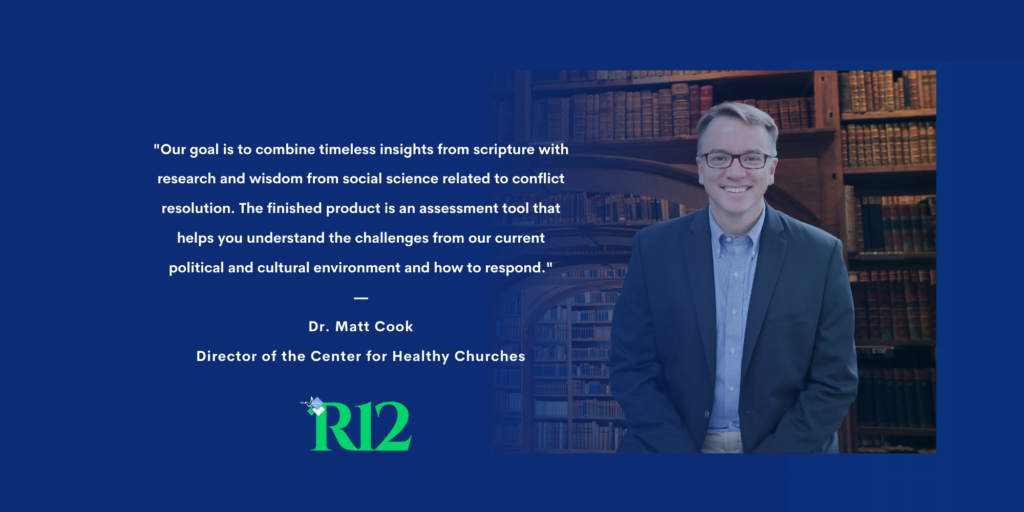2024 has arrived. As a kid, I realized that exciting things would happen every four years: an Olympic year (which I love) and an election year, which I didn’t fully understand but was momentous and thus fascinating. Later in life, when I became a pastor, however, I’d wake up early in one of those years and think to myself, “God give me strength.”
All three churches I pastored over my twenty years of pastoral ministry had a fair degree of political diversity and the challenges and tensions accompanying such diversity. I still remember the first time my phone rang, and someone on the other end wanted me to fire a staff member who had made an off-the-cuff, politically related-comment that they didn’t like.
In recent years, I’ve moved from enduring all the political toxicity to studying it. My friend and colleague David Brubaker defines polarization as the “process by which more and more people come to hold opinions at the far ends of the spectrum of belief within that society.” In other words, while we’ve always had a spectrum of political convictions in this country, there are moments in which an increasing number of people are headed rapidly toward the far ends of that spectrum. This is one of those moments.
I recommend David’s definition, but I have added something to it. Polarization also refers to the perceptions we develop of those with whom we agree or disagree as more people come to hold diverging convictions. So, it’s not just that our convictions are more divergent; it is also that they are more divisive.

As someone whose work focuses on church health, I’m less concerned about the former but deeply concerned about the latter. The Church has existed and flourished in a huge variety of political contexts. The Church has existed under kings and communists and everything in between. The Church can handle political change. However, what will truly threaten the Church is if we abandon what Jesus said was most important: loving God and our neighbors rightly.
Currently, the most influential models of political engagement rely on outrage and demonization. There’s a long list of reasons why that is happening, which makes solving the problems of polarization a wicked problem. Social media and bias-embracing forms of political news coverage have an addictive element. It is difficult (but not impossible) for our brains and bodies to separate the inflammatory criticism being leveled at the politicians and policies we despise from the chemical reactions within us when they happen. If you wonder why that person in your church keeps pounding on you and the people around them about politics, there’s a chance it’s because they are struggling with an addiction. When angry, their body produces more testosterone and less cortisol, making them feel stronger and less anxious. They are also receiving a dopamine hit akin to other forms of addiction, such as gambling, extreme sports, or even drugs like cocaine and methamphetamines. Anger is addictive.
A friend recommended an eye-opening book called Change or Die to me a few years back. As you can probably guess, the book is about how people change. One of the most powerful illustrations in the book involves the moment when a cardiologist tells a patient, “You are going to have to change your habits, or you will die!” Guess how many patients make those changes when faced with such advice. It’s 10%. That’s right, one out of ten people, when advised by a highly trusted medical professional that they will either change their habits or die, follow through with that advice. Now, imagine yourself on a Sunday morning getting up into the pulpit in the aftermath of a recent moment of political outrage where people have been binging news coverage and saying the following: “We have to love our enemies and bless those who persecute us” and then wondering why it just bounces right off the people who most need to hear it. Your words may be full of truth and love, but when their bodies are full of testosterone and dopamine, their ears will struggle to hear you.

Truthfully, some of us aren’t even saying those kinds of things anymore. Admit it, you’re angry too, right?!? You’re angry at the “libs” for defending abortion, angry at maga-world for their flirtation or outright embrace of racism and Christian nationalism, angry at both sides because they are always angry, and you don’t want to be. We’ve stopped saying we need to love our enemies because our enemies most certainly don’t love their enemies, and their way seems to be working.
On the other hand, some of us aren’t saying we need to love our political opponents because experience has taught us that saying anything about politics will likely get everyone riled up. No-talk rules when it comes to politics have been around for a long time in congregations, and it is very possible that they are grounded in a desire to love. Furthermore, there is wisdom in the idea that we shouldn’t focus on our disagreements but on a common mission. What we also must recognize, however, is that no-talk rules can and often have sinister side effects. Look at the recent lawsuit coverage against Paul Pressler, Southwestern Baptist Theological Seminary, First Baptist Church of Houston, the Southern Baptist Convention, and the SBC Executive Committee. No-talk rules always favor the status quo, often favor those in power, and have the greatest negative consequences for the disinherited and underprivileged. I’m not saying that if your congregation isn’t talking about politics, that makes you as bad as those who are enabling sexual abuse. I am saying, however, that not talking about issues of justice and morality, political though they may be, means people are getting hurt.
I’m also saying that if the Church isn’t talking about politics in ways that reflect the heart and mind of Jesus, then the only models the people in our congregations will hear are almost certainly the loudest and angriest voices. I remember, as a teenager, the uneasy reluctance of the Church to talk about sex at the exact same time that the culture was literally bombarding everyone with it. How did that work out for us? I’m not suggesting you get up in the pulpit on Sunday and give them both barrels. On the contrary, that strategy will only work if your goal is to preach to the choir. What I am suggesting, however, is that no-talk rules will have a very low ceiling when it comes to equipping the people in our congregations to navigate the challenges of this present political moment. We need to talk about what matters, AND we need to do it in ways that remind both us and our enemies that our enemies are actually our neighbors that we are commanded to love.

In Change or Die, the author talks about an experiment that Mutual of Omaha conducted with two groups of cardiac patients. One group got expensive surgery; the other group got a form of group motivational therapy. For three months, they met three times a week and, after that, weekly. They learned together, exercised together, and shared their struggles. Guess which group turned out to be healthier in the long run? Despite overwhelming confidence in the conventional wisdom that surgery was the best and only route, the communal, group therapy approach to health beat the individual route, and it wasn’t even close. Of course, researchers have known for years that one of the only lasting ways to beat addiction was being a part of a community of accountability. Alcoholics Anonymous works because the twelve steps assume that it will require a community of people to live them out.
On our own, we are powerless to change the political culture; we can’t even change ourselves. We will not read our way out of this problem; we will not preach our way out of this problem; we will not even legislate our way out of this problem. I can make a really good case for the fact that much of our current political polarization stems from our abiding failure to truly talk together about America’s original sin of racism. We thought that policies would solve the problem, but they didn’t. While I, for one, think we need those policies, I don’t think that racism is going to be solved with laws if our primary tool for addressing it is an appeal to individual rights. Politics is always downstream from culture, and information doesn’t change the culture. Our minds can always find someone selling us what our heart wants to believe.
What does change the culture are communities that model a better way, which brings me to some good news. We have a cure for polarization–it’s called being the Church. I’m convinced that the only thing liable to turn the rising tide of political outrage is for the Church to be more than simply a collection of individuals ever more tempted to either fight or flight. We have to be a community that does the long, slow, complex work of loving each other despite our differences even when it’s hard…especially when it’s hard.

The Church has dealt with similar challenges before. We sometimes forget just how diverse the world was in which the Church was born. From its earliest days, the Church had to delineate both the blessings and boundaries of diversity. Jesus himself gave us our first and best model for how life transformation works. He did it with twelve vastly different human beings, including people who represented the opposite ends of the Jewish political spectrum: a pro-government tax collector named Matthew and an anti-government revolutionary named Simon, who was a (assumedly) former Zealot. Much of Paul’s writing deals with this exact challenge. We’ve done it before; we can do it again.

The purpose of this article then is two-fold. First, I wanted to convince you that loving our enemies is part of the mission and that we can’t do that if we aren’t willing to talk to them. It seems pretty basic, but then many of us, including me, if I’m honest, find that challenging. Regardless, the acid test of our faith isn’t whether we can love people like us; it’s when we can love people who persecute us, reject us, and say all manner of terrible things about us.
Second, I wanted to announce that we have been working long and hard on creating a set of resources to help. For the past two years, we’ve been developing something called R12. Based on the words of Romans 12 to “bless those who persecute us,” grounded in the abiding call of the New Testament to “love our enemies,” and informed by the insights of social science on how humility and community are among our best tools for changing hearts and minds, R12 is designed not primarily for individuals but for congregations to become communities of love and dialogue amidst political and cultural differences. Those resources will include, among other things, an online polarization assessment for congregations, a leadership workshop designed to create awareness and urgency for responding to polarization, and a multi-week bible study to help form your entire congregation in the way they can practice love amidst difference.
This year, we will also focus some of our writing on the topic of polarization on our blog to share some of the data that has informed our thinking and some of the sources that have shaped what we’re creating. Our blog is a free resource that we hope you’ll use and share with others.
As we gear up for all the political toxicity already coming our way, we hope to contribute to a different model for responding to polarization. There are alternatives to outrage (which feels good momentarily but only contributes to polarization and gridlock) and avoidance (which feels safe but always falls short of the Kingdom Jesus calls us to build). Let’s make that our resolution in an election year.
The Center for Healthy Churches and PneuMatrix announce R12: The Church Responds to Polarization coming in February 2024.


Leave a Reply